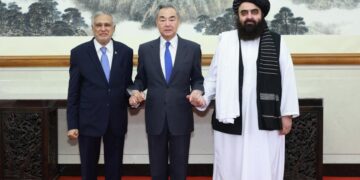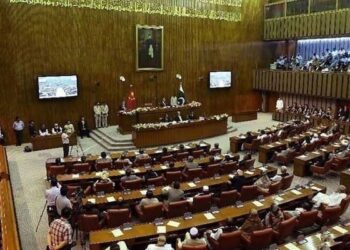KARACHI; The Pakistan Stock Exchange (PSX) broke through the 150,000-point barrier on Tuesday as upbeat economic forecasts and energy sector reforms boosted investor confidence.
The benchmark KSE-100 Index closed at 149,770.74 points, gaining 1,574.32 points or 1.06% from the previous close of 148,196.42. During the session, the index surged to an intraday high of 150,323.38, up 2,126.96 points (1.44%), before easing slightly. The day’s low was recorded at 148,293.94, still up 97.52 points (0.07%).
Analysts attributed the surge to fresh liquidity from mutual funds and improved market sentiment. “Mutual funds liquidity is rerating the market. Plenty of cash is taking a medium-term view. Valuations are not cheap anymore,” said AAH Soomro, an independent investment and economic analyst.
Investor optimism was further lifted after Fitch Ratings projected Pakistan’s GDP growth to rise from 2.5% in 2024 to 3.5% by 2027, citing better fiscal management, structural reforms, and recovery momentum. Fitch also highlighted Pakistan’s improved sovereign credit profile, following its April 2025 upgrade of the country’s Long-Term Issuer Default Rating (IDR) to ‘B-’/Stable from ‘CCC+’. Earlier, Moody’s had raised Pakistan’s rating from ‘Caa2’ to ‘Caa1’ with a stable outlook.
Separately, the government’s Task Force on Power announced a five-year plan to address the ballooning gas circular debt, now at Rs2,600 billion. The strategy includes:
- A Rs5 per litre petroleum levy to generate Rs500 billion,
- Rs500 billion in dividends from state-owned oil and gas companies, and
- Revenue of Rs500 billion annually by diverting two LNG cargoes per month from Qatar to international markets.
According to a Petroleum Division official, these measures could reduce the debt by Rs1,500 billion, while the remaining Rs1,100 billion — mainly surcharges and interest — may be settled through waivers.
On Monday, the KSE-100 Index had already gained 1,704.79 points (1.16%) to close at 148,196.42, hitting an intraday high of 148,395.71 before easing back.

























